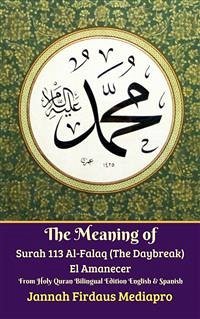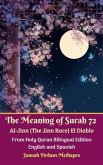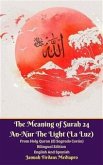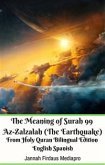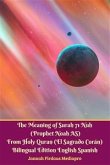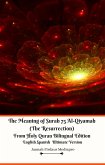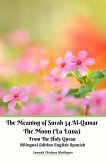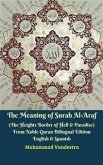The Meaning of Surah 113 Al-Falaq (The Daybreak) El Amanecer From Holy Quran Bilingual Edition In English & Spanish Languange. Surah al-Falaq (The Daybreak") is the 113th surah of the Qur'an. It is a brief five verse invocation, asking Allah SWT (God) for protection from the evil of Satan. This surah and the 114th (and last) surah in the Qur'an, an-Nas, are collectively referred to as al-Mu'awwidhatayn "the Refuges", as both begin "I seek refuge", an-Nas tells to seek God refuge from the evil from within, while al-Falaq tells to seek God refuge from the evil from outside, so reading both of them would protect a person from his own mischief and the mischief of others. The word "al-Falaq" in the first verse, a generic term referring to the process of 'splitting', has been restricted in most translations to one particular type of splitting, namely 'daybreak' or 'dawn'. Verse 4 refers to one of soothsayer techniques to partially tie a knot, utter a curse and spit into the knot and pull it tight. In the pre-Islamic period, soothsayers claimed the power to cause various illnesses. According to soothsayers the knot had to be found and untied before the curse could be lifted. This practice is condemned in verse 4. Surah al-Falaq (La aurora) es la 113ª surá del Corán. Es una breve invocación de cinco versículos, pidiéndole a Allah SWT (Dios) protección contra el mal de Satanás. Esta sura y la 114ª (y última) sura del Corán, an-Nas, se denominan colectivamente "los Refugios" de al-Mu'awwidhatayn, ya que ambos comienzan con "Yo busco refugio", an-Nas dice que busquemos refugio de Dios del mal desde dentro, mientras que al-Falaq nos dice que busquemos refugio de Dios del mal desde fuera, de modo que la lectura de ambos protegería a una persona de sus propias travesuras y de las travesuras de los demás. La palabra "al-Falaq" en el primer verso, un término genérico que se refiere al proceso de "división", ha sido restringido en la mayoría de las traducciones a un tipo particular de división, a saber, "amanecer" o "amanecer". El verso 4 se refiere a una de las técnicas del adivino para atar parcialmente un nudo, pronunciar una maldición y escupir en el nudo y apretarlo. En el período preislámico, los adivinos reclamaban el poder de causar varias enfermedades. Según los adivinos, el nudo tenía que ser encontrado y desatado antes de que la maldición pudiera ser levantada. Esta práctica es condenada en el verso 4.

